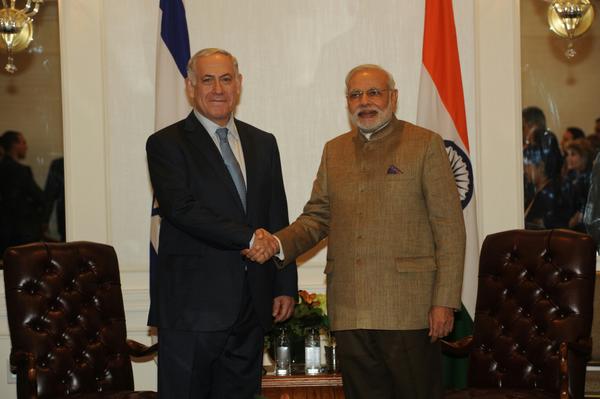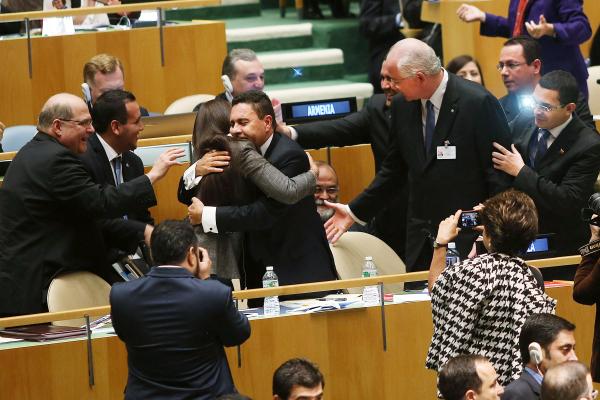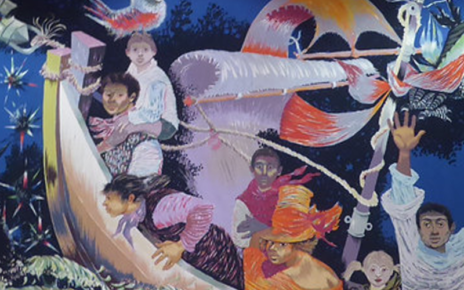While it is not widely known, India and Israel have a strong historical and economic bilateral relationship. Jews arrived from Israel first to Kerela (a Southern State in India), in 526BCE. When they were admitted into the state it was established that they could stay “as long as the world and moon exist,” and ever since that ancient time, India’s Jewish community has lived and prospered with full freedom in India.
India and Israel today share many historical, political, and security features on which the under-the-radar relations hinge. India and Israel both have parliamentary democracies, a common law structure, and have a history of British colonialism. Both are functioning democracies and have survived in a sea of hostilities while surrounded by uncompromising adversaries and a heavily militarized environment. They both also face external and internal security threats in the form of terror attacks from radical Islamic groups. At the same time, both states have remained havens of stability in chaotic regions that stretch from North Africa, the Maghreb, to the Hindu-Kush mountain range, which has always defined the unstable regions of Afghanistan, Pakistan, and Iran.
India and Israel formally established diplomatic relations in 1992 and its history has been tenuous. Since 1992, both parties have subtly, but tirelessly, worked to build bilateral relations. Today, India and Israel have a strong defense industrial partnernship. India is the Israeli industry’s largest customer and Israel is India’s second most important supplier of weapon systems. The Indian President, Pranab Mukherjee, on his most recent visit to Israel, noted “Israel has crucially come through for India at times when India needed them the most” describing Israeli help in the 1965 and 1971 wars with Pakistan. The President continued; “I described Israel as one of the most important countries for India has provided defense equipment, platforms and systems at a time when India needed them most. We discussed the need to expand cooperation in solar energy…water management, horticulture, animal husbandry and agriculture as well as cooperation between Indian Space Research Organization and Israeli Space Agency.”
Clearly, both states have a lot in common and work well together in terms of interdependence and trade. However, the relationship is low key one that is cloaked and often not considered. It is this fact that makes this seemingly perfect diplomatic relationship so difficult to read.
The answer lies in recent history, which requires an analysis of the history of Israeli-Indian relations very shortly after their independence. 1948 to 1992 marked the strengthening of relations between the two states; however, it included many obstacles and arguably still does today. India, in 1948 and even today, had a strong and vocal Muslim minority population. In 1948, shortly after Israel’s independence, India hesitantly proposed opening a line of diplomatic communication. Prime Minister Nehru’s Minister of Culture,Maulana Abul Kalam Azad was also his unofficial adviser on Arab and Muslim issues. He cautioned the Prime Minister to delay creating diplomatic ties with this newly founded state of Israel due to issues of misinterpretation by states with Muslim populations. This was an especially pertinent issue due to the recent trauma the partition of India had caused. Additionally, India was still dealing with the dispute over Kashmir with the predominantly Muslim state, Pakistan, and its Arab supporters. Creating formal diplomatic ties with Israel, at the time, would not have been a wise decision.
In 1947, India was a member of the United Nations Special Committee on Palestine (UNSCOP) and had proposed a minority plan that allowed for the establishment of a Federal Palestine with internal autonomy for the Jewish population. The UN General Assembly then voted for the majority plan to provide the creation of two states. However, India opposed the plan of partition and did not recognize Israel as a state. A lot of India’s foreign policy and rhetoric at the time stemmed from its own trauma of partition and its relations with Arab states and its own Muslim population. The Indian government at the time also strongly believed that creating two states based exclusively on religion would revive Islamic fanaticism. On President Mukherjee’s last visit to Israel, the Times of Israel stated that the President “has indicated that India does not plan on abandoning its traditional support for Palestinian statehood.”
Today, the Indian government has tried to avoid taking sides in the Israeli-Palestinian issues; India and Israel both face the threats of terrorism and radical religious groups. This has shifted foreign policy in favour of each other. With such threats, they have created military and economic ties, as they both understand the circumstance of the other.
In the sphere of foreign policy, there are many players and many interests. As already noted, India has its own shifting policies, and internal interest parties at play, for and against close relations with Israel. Israel, on the other hand, stays weary of India’s cordial relations with Iran. Culturally, there are a few similarities between India and Iran with the Islamic conquests in sixth century BCE. While Iran has supported Pakistan in many violent outbreaks between India and Pakistan, especially with their stance on the issue of Kashmir, their relationship has not been characterized by outright hostility.
Iran is of strategic importance for India, most especially, in an economic setting. Iran has hydrocarbon resources and holds 10% of the world’s crude oil reserves and approximately 15% of natural gas reserves. The imports of oil from Iran are the biggest asset to India’s rapid energy growth, especially when 600 million Indians lack access to electricity.
In geo-strategic terms, Iran serves as a land bridge to the Caucasus and states in Central Asia, North and Central Africa. Iran allows India an access to Afghanistan, for both economic and security purposes. This economic relationship also threatens Israeli interests, while they also keep close relations with India. The Indian-Iranian relationship has always been on the agenda for bilateral relations with Israel. Israel has repeatedly expressed to India its fears of Israeli technology falling into Iranian hands.
The story of Indian-Israeli relations is an interesting one. While both benefit greatly from their economic, military and agricultural ties, there is still a lot to discuss in terms of international relations and diplomatic growth. Amiable Indian-Israeli relations present a window of opportunity for Canadian and international economic and political growth.




